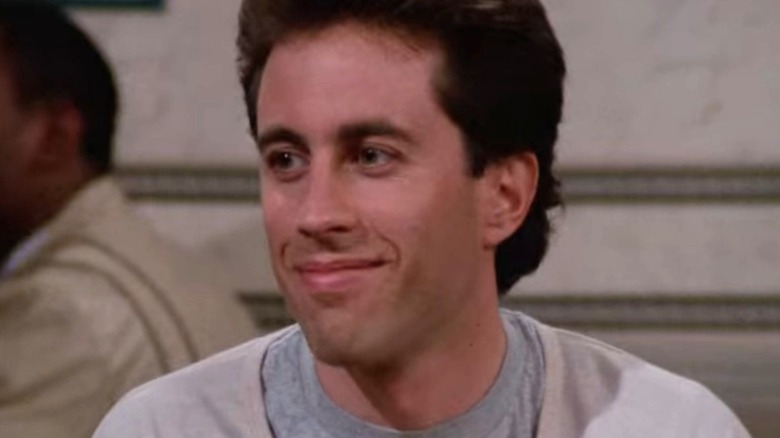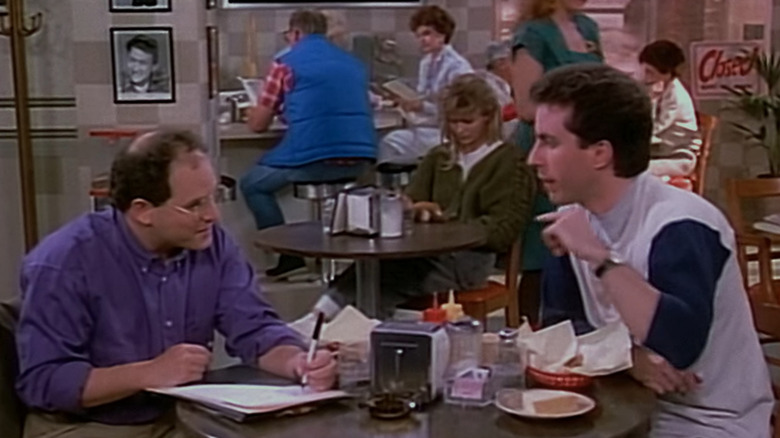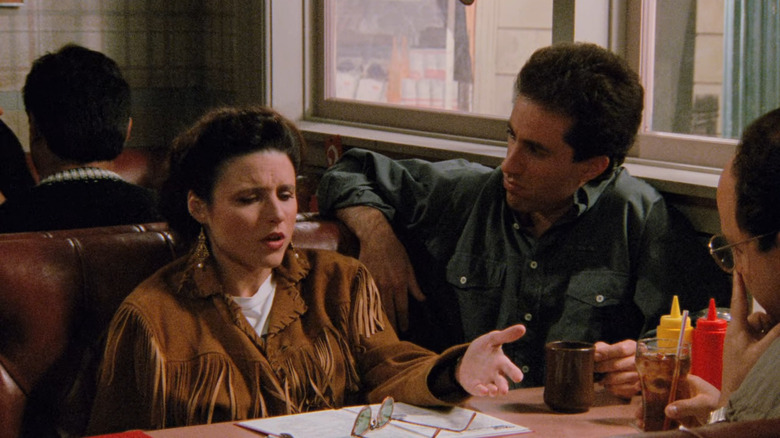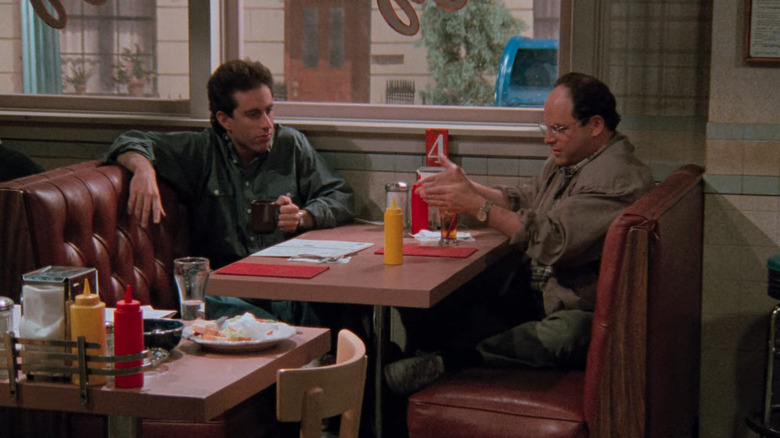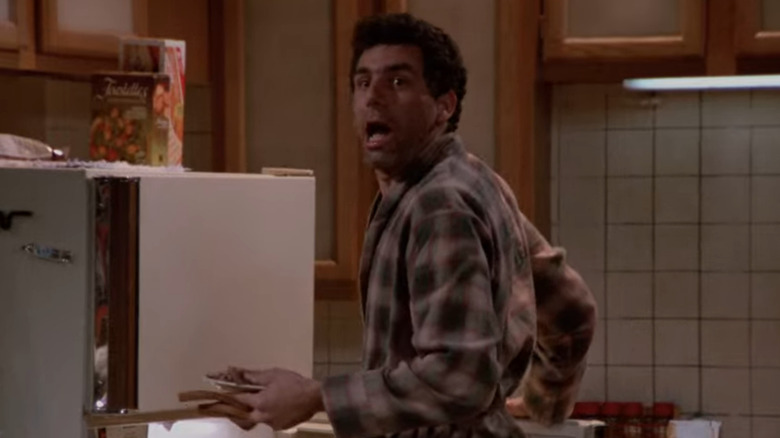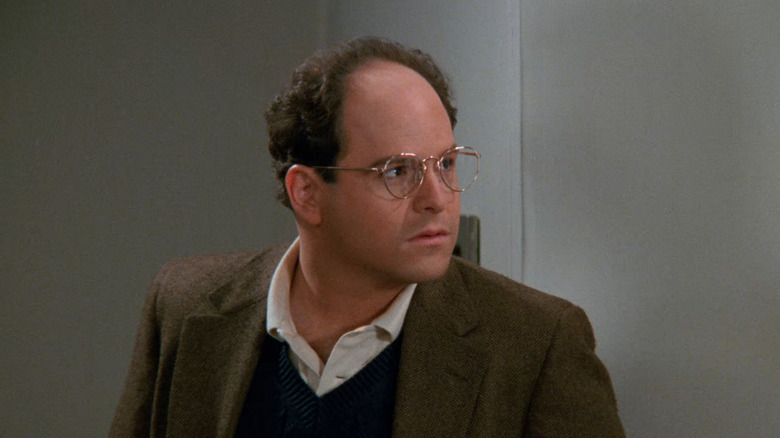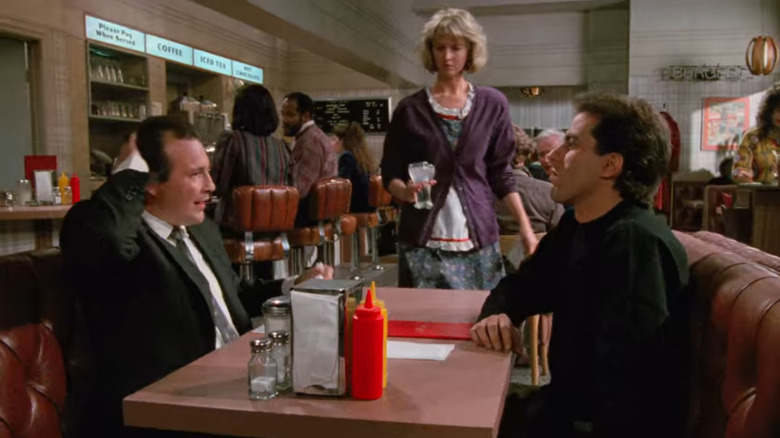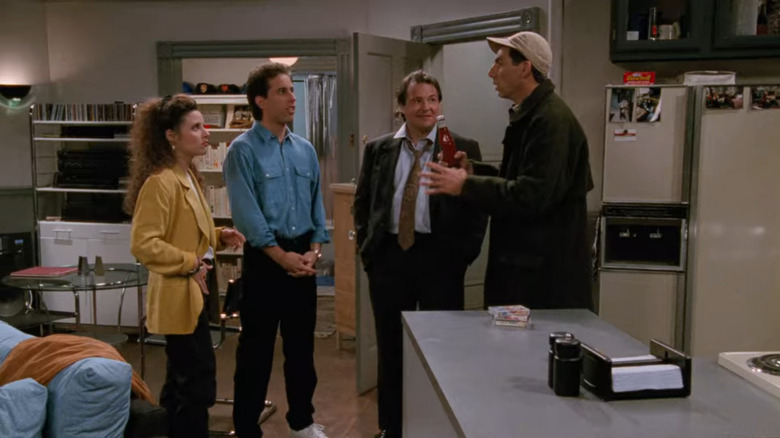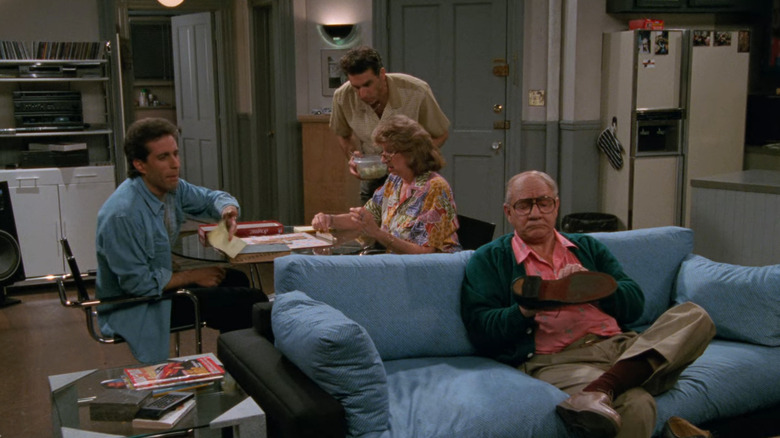The Long-Running Seinfeld Gags You Didn't Know Were Introduced In Season 1
First seasons are notoriously difficult to nail down. Creators and networks often have conflicting visions, shows need to introduce new casts and scenarios to the audience, and all this happens while the creators are trying to secure a follow-up season. As such, even classic sitcoms like "Seinfeld" are known for having shaky early seasons in which the cast hasn't fully clicked with one another and major recurring themes have yet to land. Breaking new ground in the sitcom formula isn't easy, and for "Seinfeld," that meant an abbreviated Season 1 that very easily could have gone the way of the dodo. As we know, the series went on to become one of the best-known sitcoms of all time, but that legacy was anything but obvious in the show's earliest days.
Still, the first season of "Seinfeld" is incredibly funny despite it all, and seeing the cast find their legs as their dynamic begins to click remains a delight, especially with the knowledge of all that was to come. What's more, plenty of the show's best jokes are first seen in that five-episode outing, making it an important era for solidifying the concepts that made the show so successful. From Kramer's wild personality to Elaine's disgust with humanity to George's compulsive lying and, of course, Jerry's irreverent stand-up observations, Season 1 of "Seinfeld" had all the pieces it needed to make comedy gold.
Button at the top of the shirt
After the initial stand-up introduction of Jerry Seinfeld, the first joke of the series starts with him and George sitting in the diner they would come to frequent in so many episodes going forward. While George is writing something down, Jerry points out that the button second to the top is the key button of every shirt, but the top button is positioned strangely, a bit too high up, and is an odd design choice. George is bemused but doesn't have an opinion either way, good-naturedly letting Jerry get it out of his system before moving on with the conversation. This is a seemingly odd choice for an opening line, but in retrospect, it defines so much of Jerry's meticulous personality and the enjoyable puzzlement the two have for one another that it ultimately seems pretty perfect.
The last episodes of "Seinfeld" – where the gang lands themselves in prison after a series of misadventures — are controversial among fans. Though it seems on the surface that their lives might be over, we see that the status quo set in that very first episode remains much the same. Jerry again obsesses over George's shirt, pointing out that the top button is in "no man's land." George nods along without forming much of an opinion, then asks if they haven't had this conversation before. Jerry concedes, "Yeah, maybe we have," Jerry replies as the series draws to a close.
Elaine vs. pets
As one of the pillars of the series, it always feels a little odd that Elaine Benes doesn't appear in the pilot episode and is instead introduced in Episode 2, "The Stake Out." Though it's true that Season 1 didn't always seem to fully know what to do with Elaine and it took a bit of time for her character to emerge, there are still some classic Elaine moments in that first outing. Julia Louis-Dreyfus is one of comedy's greatest stars, having long since solidified an expressive and physical style of humor based on a general distaste for humanity that has carried her into series like "The New Adventures of Old Christine," "Veep" and even into the MCU. Though it took a few episodes, she ultimately became a "Seinfeld" fan favorite.
Still, there's no denying that Season 1 Elaine has her moments. A pescetarian who chides Jerry for ordering the tuna due to its environmental cost, Elaine isn't always that understanding of the animal kingdom herself. In "The Stock Tip," she explains that she's dating a man with two cats, asking what it would cost to have a cat "rubbed out." Jerry guesses $14, to which she replies, "Wanna make $28?" This general theme of Elaine vs. pets shows up several times in the series, notably in the Season 5 episode "The Glasses," in which she is bitten by a dog but finds herself nervously asking her friend group about getting a rabies shot. In every instance, when it's Elaine vs. pets, the win goes to the pets.
Jerry loves Superman
When it comes to Jerry's interests, he seems to enjoy most of the regular activities of a New Yorker in the '90s, such as hanging out at diners with his friends, attending sporting events, watching TV, and going to movies. Yet, one particular love of Jerry's is Superman. Sporting a picture of the superhero on his fridge and constantly referencing him throughout the series, this interest becomes the center of dozens of jokes. That all starts in Season 1, when George and Jerry debate whether or not Superman is funny, with Jerry insisting that logic would entail that he has to be.
In "The Stock Tip," the two friends sit in a booth at the diner, deep in conversation about if Superman's powers include super humor. "I think Superman probably has a very good sense of humor," Jerry insists, to which George dismissively responds, "I never heard him say anything really funny." This leads to Jerry making a plea on behalf of his favorite hero, using the red and yellow condiments bottles on the table to illustrate his point about the red sun of Krypton and the yellow sun of Earth. Even after all this, George is firm in his beliefs, declaring, "He ain't funny."
Superman would go on to appear often enough in the series that he almost qualifies as a cast member, and Jerry's inclination to defend him never wanes.
Kramer's entrances
Jerry's mysterious neighbor Kramer is initially known almost exclusively for being the most brazenly obtrusive man on the planet. While he would later reveal a more complicated past, with a wild lifetime of bizarre interactions and acquaintances which led to the creation of the man we meet in Season 1. Still, for all the back story and off-handed references to people from his past as he makes throughout the series, he remains perhaps best known for making the kind of entrances that can't help but completely disrupt and refocus a scene. The series often uses him to transition from one scene to the next, and it grows to rely on his zany subplots to help throw some extra layers into an episode's format.
Though we come to know a lot more about this strange guy later and after he experiences a name change from Kessler to Kramer, his first appearance gives us some foundational information on what to expect from him. Though he knocks instead of sliding through the doorway, he also immediately gives away who won the night's Mets game, which causes Jerry to cry out in despair as he was hoping to watch it on VHS later that day. Kramer shrugs, "I thought you knew!" before pulling two slices of bread out of his pocket and holding them out. "Got any meat?" he asks. Jerry, still distraught, waves him toward the fridge. "Go! Hunt!" he cries. This is a bare-bones version of what would go on to be one of the strongest dynamics of the series.
Art Vandelay
George Costanza is often cited as a stand-in for "Seinfeld" co-creator Larry David, and many of George's quirky traits would follow David into his next series, "Curb Your Enthusiasm." While "Seinfeld" undoubtedly centers on Jerry's life as a comedian trying to make things work in the New York dating scene, George is his constant companion and a crucial part of what makes the series click. While Jerry's pickiness is a defining trait, George has his own issues, including hilarious outbursts, a love of luxury, and a tendency toward compulsive lying. Nowhere is that more evident than with his alias Art Vandelay, who he initially comes up with in "The Stake Out."
After Jerry meets a woman he's interested in at a dinner party, he attempts to casually hang out in a place he knows she'll be in hopes of prompting further interaction. When he expresses how weird and nervous he feels, he follows up by asking who George even is in this scenario and what he's doing there talking with Jerry. George immediately responds, "I'm an architect." Jerry frowns, "You're an architect?" George replies, "I'm not?"
As Jerry continues to question him, George comes up with the name Art Corvelay, which he quickly changes to Art Vandelay. This seemingly one-off joke comes back many times in the series, including in the final episode, "The Finale," in which the judge overseeing the trial is named — you guessed it — Arthur Vandelay.
It's not you, it's me
The line, "It's not you, it's me," is often used to diffuse hurt feelings during a necessary breakup, but as with so many everyday sayings, it truly took on a life of its own on "Seinfeld." Perhaps best remembered for appearing in the Season 5 episode "The Lip Reader" when George's girlfriend Gwen breaks up with him, assuring him that, "It's not you, it's me." The usage of the line infuriates George, who claims to have invented the saying, insisting, "If it's anyone, it's me!" Naturally, this leads to a series of mishaps throughout the rest of the episode as the vain George attempts to get to the bottom of why Gwen broke up with him, assuming that it was because she saw a video of him messily eating ice cream.
This quote made its first appearance in the Season 1 episode "Male Unbonding." When Jerry is beset by requests to hang out from a friend from childhood named Joel, who doesn't listen, has no shared interests with Jerry, and distresses him through his treatment of others, he attempts to arrange for a breakup. The moment he begins the speech, Joel immediately overreacts, assuring him that he can change and things will be different. Jerry even tries to tell him, "It's not you, it's me," but Joel bursts into tears, leading Jerry to grudgingly reinstate their friendship by giving George's tickets to a game they were planning to attend to Joel.
Make your own pie
Kramerica Industries became a major recurring joke for "Seinfeld," based on Kramer's off-the-wall concepts for new businesses that typically seem not just unnecessary but easily dangerous enough to lead to serious bodily harm. The first among those was the "Build-Your-Own Pie" concept that first appeared in "Male Unbonding." While Elaine politely listens and encourages him, to Jerry's consternation, Kramer goes into a sales pitch to a pizza restaurant that would allow customers to make a pizza from scratch. George attempts to dissuade the idea by noting the obvious safety hazards of allowing the general public to hand hot ovens, but Kramer insists that there will be supervision — without explaining what that would actually entail.
This idea comes back in the Season 6 episode "The Couch" when Kramer teams up with his friend Poppie — who has had troubles with the health board since the Season 5 episode "The Pie" — to make his dreams a reality. Though the opening shows a surprising turnout, the restaurant goes off the rails, and not for the expected reasons. When Poppie declares an anti-choice stance on abortion, Elaine responds by walking out in protest, causing an uproar among the patrons. Though the gang attempts to make amends, the situation only gets worse from there, showing that the potential for disaster for Kramerica Industries isn't limited to physical safety.
Using made up and incorrect words
Another solid running joke throughout "Seinfeld" is the tendency of characters to misuse or make up words, most often characterized by Elaine. Though generally regarded as a bit sharper than the other three main cast members, that doesn't mean she's perfect, and she often mispronounces things to comedic effect. For one, in the Season 3 episode "The Alternate Side" she seems to believe a popular misconception that a vomitorium is a room where people hang out and vomit, rather than its practical application as an exit in a Roman amphitheater. When she asks if someone could die of a bad smell in a vomitorium while sitting next to George, George asks, "Do I smell?"
While this is a running theme, it makes its first appearance in "The Stake Out." While Jerry sits in his apartment with his visiting parents playing Scrabble, he is distracted, which allows Kramer to come in and attempt to "help" Jerry's mother win the game by suggesting the word "quone." This irritates Jerry, who insists that it's not a real word. When he says he will have to challenge it and picks up a dictionary, Kramer argues, "No, you don't have to challenge that, that's a definite word!" When Jerry flips open the dictionary, Kramer yells, "Quone! To quone something!" while Jerry's mother shakes her head, saying, "I'm not playing with you anymore." Jerry's dad — here played by Phil Bruns — is cleaning his shoe on the couch and yells, "Quone's not a word!"
